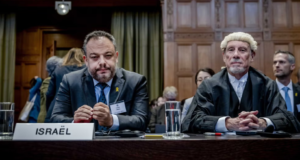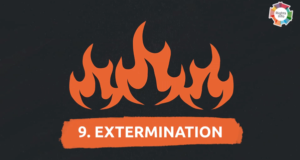By Gideon Levy
The young fisherman is now in hospital, feeble and pale, one leg in a cast held in place by iron screws. He is awash with pain. His mother does not leave his bedside. A blind Palestinian physician takes him for a brief physiotherapy session in the corridor. Mohammed Masalah leans on a walker. The blind orthopedist encourages him to take one step and then another, but the pain defeats him and he asks to be taken back to bed.
The sea is the same sea and the Arabs are the same Arabs, as an Israeli prime minister once said. Only the cease-fire is no longer the same cease-fire. On land and in the air it is generally maintained, but not at sea. There, Israeli forces continue to shoot at fishermen from besieged Gaza, who are trying to wrest from the sea a living that is so difficult to make on land.
Gaza’s 40,000 fishermen have been deprived of their livelihood. Before the siege, they caught 3,000 tons of fish a year; now it is 500 tons. The fishing season begins with the advent of winter, when schools of fish migrate from the Nile Delta and the waters off Turkey toward the Gaza area. But few of them are now entangled in the nets of Gaza’s fishermen. Today, most of the fish can be found about 10 miles offshore, in an area that is off-limits to the fishermen. Israel has restricted them to a six-mile limit, though sometimes navy boats attack at three miles – just to keep the fishermen honest.
The siege makes it hard to obtain fuel for the fishing vessels, and also the sea is polluted with 50 million liters of sewage every day, following the collapse of the sewage infrastructure in the Gaza Strip. Israel’s fish markets are also closed to merchants from Gaza.
Hardest of all, though, are the naval attacks. Every few days the International Solidarity Movement (ISM) publishes reports from its volunteers in Gaza about attacks on fishermen. Sometimes the naval boats ram the wretched craft, sometimes the sailors use high-pressure water hoses on the fishermen, hurtling them into the sea, and sometimes they open lethal fire on them. The boat of Mohammed and his friend, Ahmad Bardaawi, came under such fire for about 20 minutes, until the two managed to get away, with Bardaawi rowing for all he was worth. A bullet slammed into Mohammed’s leg, however, and it was hours before he reached the hospital, after a long, exhausting and bloody journey along the Rafah coast with his friend. The physicians in the Khan Yunis hospital wanted to amputate. Now, with Israel’s permission, Mohammed is being treated in a hospital in East Jerusalem, and his leg will probably be saved.
“The ebb, the tide, the sighs / The sailor who whitens the trunks of tamarisks / The gatherers of conches collect on the shore / Seagulls’ broken keening for desperate love,” Meir Banai sings to the words of Natan Yonatan’s poem “The Fisherman’s Prayer.” There is nothing very romantic about Mohammed’s story. Certainly there is no keening of seagulls, and what is desperate is the need to provide for a family, and the prayer that he will be able to walk on both legs again.
A fisherman will get up at around 2 A.M. and walk about three kilometers in the dark to the shoreline, where a rowboat awaits him. There’s no money for fuel, and in any case it’s hard to find fuel in Gaza, so it’s row, row, row your boat – as far out as Israel allows. Dabur-class patrol boats lurk everywhere. As everyone knows, the occupation of Gaza has ended, and the Strip has been completely liberated.
Mohammed Masalah is a 19-year-old twelfth-grader, the son of a fisherman from the Tel al-Sultan neighborhood of Rafah. His father no longer goes out to sea. Mohammed does most of his studying at home, and three or four times a week goes to fish at night. Since the age of 16, he has been getting his schooling in the morning and fishing at night. He has about 700 fish hooks that he throws into the water, hoping for the best. Now is the season of the groupers and red snapper, known in Gaza as farfur. On a very good night he catches 15 kilograms of fish, two kilograms on a bad night, and there are also nights with nothing. Fish go for NIS 50 per kilo in an abundant season, double that when there are no fish. He splits the earnings with his companion. Their GPS tells them where to stop: 1,800 meters from the shore, no more.
“If the Jews have a good ‘shift,’ they let us stay; if not, they start shooting and we have to escape,” he says in a weak voice from his hospital bed. About a month and a half ago, Israeli sailors broke his oars. At first light, he says, he and his friend would head home to do their homework and study for exams.
The night of October 5th was no different. Mohammed’s mother woke him, and at 2 A.M. he met up with Bardaawi and they headed for the sea. At 3:30 the two young fishermen reached the limit allowed them and cast anchor. Close by was the rowboat belonging to Bardaawi’s cousin. They were about to cast their hooks when they suddenly noticed a flashing red light; a red light, they know, means danger. The Dabur was lying in wait, with all lights except the red one turned off.
The firing began instantly, on both sides of the boat and over their heads. Masalah says that this time no warning flares were fired, as is usually done. No one bellowed at them to move away through a megaphone. Indeed, the soldiers always yell at them to get out, but not that night. The young men were about 70 meters from the patrol boat, and Masalah was hit in the first volley. His leg felt as though it had caught fire, and he started to shake all over. Bardaawi grabbed the oars and started to row furiously, the Dabur speeding in their wake. Masalah, shouting with excruciating pain, pressed on his leg to try to stanch the bleeding. The shooting lasted about 20 minutes, he says.
Reaching safe haven at last, they sent one of the children of the fishermen on the beach for help. The ambulance was slow to arrive, so a vehicle belonging to the Palestinian Coast Guard rushed Masalah to Yusuf Al-Najjar Hospital in Rafah. There was no physician on duty. In the meantime, the ambulance showed up and took Masalah to the European Hospital in Khan Yunis. (They did not take him to Shifa Hospital in Gaza City, because the physicians there are on strike against Hamas.)
Masalah’s bleeding worsened, chills ran through his body and he lost consciousness. The doctor said his leg would have to be amputated, but the family begged him to wait. They wanted to transfer him to a hospital in Israel, but the Palestinian Authority refused to pay for that, and suggested Makassed Hospital in East Jerusalem. It took three full weeks to collect all the necessary permits to leave Gaza. Masalah and his mother were granted “hospitalization authorization” from the Interior Ministry of the State of Israel, signed by Major Azhar Ghanem, head of civil coordination. The permit was valid for one day, October 26, 2008, from 5 A.M. until 7 P.M. By the time they went through the Erez checkpoint and reached the hospital, it was already 4 o’clock.
Masalah and his mother, making their first visit outside the Gaza Strip, are now “illegally present” in East Jerusalem. She spends the nights in an armchair by his bed, and he is focusing on trying to rehabilitate his leg. He has had one operation and will need two more.
The IDF Spokesman’s Unit has stated in response that, “an investigation with the Israel Navy found that no casualties were identified in this event. On the night between October 4 and October 5, two Palestinian fishing boats went past the area in which fishing is permitted. The navy launched warning flares and implemented deterrent fire only, with the emphasis on avoiding casualties. An additional check with the navy, at the correspondent’s request, did not turn up any new findings.”
 International Solidarity Movement Nonviolence. Justice. Freedom.
International Solidarity Movement Nonviolence. Justice. Freedom.


